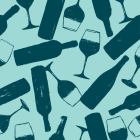Bordeaux wine outperforms Hermes handbags as best luxury investment
Fine wine from Bordeaux toppled designer handbags, cars and watches as the best performing luxury investment during the pandemic, according to Knight Frank’s latest Luxury Investment Index.
The analysis found that in the 12 months leading to June 2021, the average price of investment grade wines rose by 13%, while the average price of a Hermes Birkin bag dropped by 3%. Luxury watches and cars, meanwhile, made gains of just 5% and 4% respectively.
Andrew Shirley, editor of Luxury Investment Index, said: “Two assets that have been at the helm in recent years – rare bottles of Scotch and Hermès handbags – have relinquished their places at the top of the index.” He noted that Bordeaux vintages such as 1996 and 2000 helped to drive fine wine’s investment success.
Nick Martin of Wine Owners, which compiled the data for Knight Frank, added: “Wine is doing really well – not going crazy but growing nicely. There are no signs of over exuberance.”
Sotheby’s announces Hong Kong autumn line up
Sotheby’s has announced it will hold five wine and spirit auctions in Hong Kong this October, with over 1,300 lots expected carrying a pre-sale estimate of HK$135 million.
Taking place 7-9 October, the sale will include a range of fine and rare gems from the greatest estates around the world. On 7 October, ‘Finest and Rarest Wines + Library Vintages Direct from Seña and Chadwick’ will include lots from Chateau Palmer and Domaine de la Romanee-Conti, as well as offerings from Spanish legend Vega Sicilia Unico and American icon Screaming Eagle Winery.
On 8 October, ‘The Marvellous Leroy Collection’ will see one of the most comprehensive collections of Domaine Leroy ever go under the hammer, with 313 lots estimated at HK$21 million. The collector, an avid wine lover, has been collecting wine for more than three decades and is one of the earliest advocates of Domaine Leroy in Asia.
The series will be wrapped up on 9 October with the cellar collection of Pierre Chen, one of the world’s most prominent art collectors. The 360-lot collection features fine wine from Bordeaux, Burgundy and beyond, and is estimated to fetch a total of more than HK$88 million.
Rare vintages from Chanel’s vineyards on offer this October
Sotheby’s is set to present a selection of rare, untouched vintages direct from Chanel’s vineyards in a sale that celebrates 25 years of Chanel’s ownership of the historic Chateau Rauzan-Segla and Canon estates in Bordeaux.
The sale will feature more than 900 lots and features a range of 60 vintages with a combined estimate of £730,000. The vintages span 1917 to 2020 and will be offered in a variety of formats, from standard bottles to 18-litre Melchiors.
One of the selections features pre-war vintages including three bottles of Chateau Canon 1926 and three Magnums of the 1933 vintage. The most highly-priced wine is a rare bespoke barrel of Chateau Canon 2020 estimated at £24,000-£32,000.
Along with the rare wine collections, the sale reportedly comes with several exclusive experiences including tours and unique stays in the vineyards and chateaux, and visits to Coco Chanel’s apartment in Paris.
The sale will be open for bidding from 15 October and will culminate in a live auction on 29 October in London.
Global organic vineyard area reaches half a million hectares
Organic viticulture is gaining major ground across the world, with nearly half a million hectares worldwide now dedicated to organic vines.
According to new research from the OIV, the rate of conversion to organic viticulture has increased considerably since the beginning of the 21st century, up by an average of 13% per year since 2005, while non-organic vineyard area decreased by an average of 0.4% per year within the same timeframe
In 2019, a total of 63 countries across the world were involved in organic viticulture, while the certified organic vineyard surface area was estimated at 454,000 hectares, representing 6.2% of the world’s total area under vine.
In Bordeaux alone, there was a 43% jump in the amount of vineyard land either certified or in conversion in 2020.
According to the report, the trend can be explained in “large part by societal issues, particularly in relation to consumer health and environmental protection”.
However, the report was also careful to note that the conversion of a vineyard to organic cultivation is often complex and requires considerable adaptation, and many producers are driven to abandon their efforts by weather or organisational issues.
Cult Wines goes carbon neutral plus
Cult Wines has achieved carbon neutral plus status following an assessment by independent body Carbon Footprint.
Working with the organisation, Cult Wines identified its total emissions between January 2020 and December 2020, then tripled its carbon credit by supporting sustainability projects in various regions, ultimately offsetting 475 carbon tonnes.
These offsetting projects include reforestation efforts in Kenya, building carbon-neutral cookstoves in India and solar-powered cooking devices in China, and delivering solar and wind power in the Philippines and Thailand.
“Now more than ever, the wine industry faces a critical moment in the fight against the climate crisis,” said Cult Wines CEO and co-founder Tom Gearing. “The recent frost in France, and the fires in Napa, California and South Africa have demonstrated that climate change continues to impact vineyards and wine producers around the globe. Reversing carbon emissions and protecting the earth is imperative to the future of our industry and our planet.”






